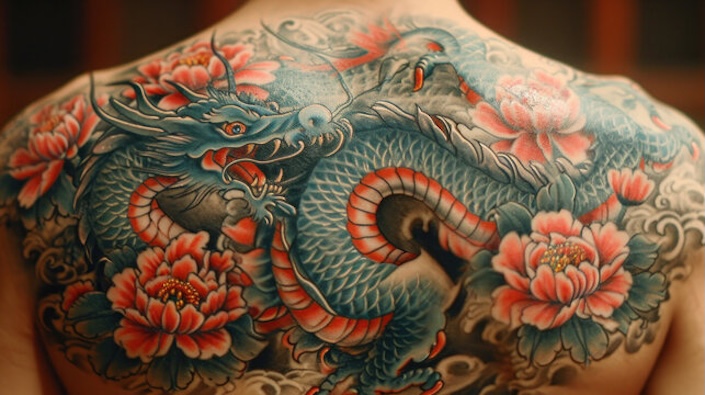Chinese Dragons: Their Types, History, and Significance
Learn Chinese in China or on Zoom and gain fluency in Chinese!
Join CLI and learn Chinese with your personal team of Mandarin teachers online or in person at the CLI Center in Guilin, China.
Sometimes, Chinese dragons seem to be everywhere. We see these symbols in sports, on clothing, in books, and in movies. Some people even have dragon tattoos.
You’ve seen dragon iconography, but have you considered where dragons originate or what they symbolize? How much do you know about the many types of Chinese dragons? Read on to discover more about China’s most famous mythological creatures.

Table of Contents
A Distinctly Chinese Cultural Tradition
For starters, it’s worth noting that the Chinese dragon, or 龙 (lóng), is very different from the European dragon. For example, while European dragons breath fire, the Chinese dragon typically breaths clouds.
The anatomy of the Chinese dragon is also unique. The head, for instance, often looks like that of a camel while the eyes look like those of a demon.
Similarly, the neck looks like that of a snake whereas its paws are those of a tiger. Contrary to what most people assume, the legendary Chinese dragon was usually not vengeful.
Ancient Chinese people didn’t usually blame dragons for natural catastrophes and other disasters. Instead, they often saw dragons as benevolent, wise, and powerful.

This canvas is available on Amazon! High quality printed artwork stretched to fit on durable and shrink-resistant canvas.
The Origins of Chinese Dragon Legends
No one knows exactly when legends about dragons first originated, but the symbol dates back to at least 3000 BCE. According to one theory, the legendary Chinese dragon evolved out of ancient totem-worship practices. Ancient people may have created dragons by combining the attributes of several creatures like tigers, snakes, eagles, and carp.
A different theory posits that the Yan emperor (炎帝 Yándì), a legendary Chinese leader from pre-dynastic times, was born of an encounter with a powerful dragon. As a result, Yandi was more powerful than most leaders. He partnered with Emperor Huang Di and together they conquered their enemies, unified China and, according to myth, pioneered Chinese civilization.
As time progressed, many Chinese came to believe that Yandi was one of their ancestors, which by extension meant that they were also the descendants of dragons
Where Do Dragons Live?
In the real world, dragons do not exist (surprise!). In the mythological stories they inhabit, however, dragons reside in a variety of places. The celestial dragon, for example, lives in the sky, while the coiling dragon lives in the sea.

According to ancient Chinese mythology, some dragons live in the sea while others live in the sky.
The Importance of Dragons in Chinese Culture
Dragons are significant in Chinese culture because they’re associated with the following:
Business prosperity
During Chinese New Year, many celebrations start with a dragon dance. The aim of the dance is not just to attract attention but also to ask for a prosperous new business year from the dragon gods.
Good harvest and health
In traditional times, Chinese farmers requested plentiful harvests by making offerings to dragon gods. When drought struck, they did the same in an attempt to encourage a downpour from the heavens. Some people also believed dragons could protect their lands and harvests from flood damage.
In addition to Chinese New Year, the dragon is a very significant creature during the Dragon Boat Festival, a Chinese holiday that’s celebrated throughout China in late spring or early summer. During this festival, dragon-shaped boat races are traditionally held.
There are many theories about how the Dragon Boat Festival originated. One theory suggests that in its earliest form, the festival was celebrated to request good health as well as a bountiful harvest from the dragon gods.
Protective tokens
In China, people believe dragons can offer protection to homes and businesses. They’re seen as protective figures that can be printed or engraved on sentimental or valuable objects.
What Do Chinese Dragons Symbolize?
Dragons are powerful creatures in Chinese mythology. They’re associated with the ability to control the seasons, time, and harvests. Generally, they symbolize the following:
Everything male – In traditional Chinese society, men were considered to be physically strong and powerful and were often influential in community matters. Dragons were employed as representations of this relative dominance in traditional society. Masculine traits, thus, were considered physical manifestations of the mythological dragon.
Nobleness – According to Chinese astrology, those born in the Year of the Dragon are more prosperous and noble than others. For example, 1988, 2000, and 2012 are considered dragon years (see our full article on Chinese Zodiac Animals). Many Chinese people consider those born during dragon years to be strong-willed, decisive, and self-confident.
Agricultural life – According to Chinese mythology, dragons control the weather and the seasons. Though most dragons are wingless, male dragons possess the power to fly to the heavens and bring rain, while female dragons control earthly waters like rivers, lakes, seas, and wells.
Good fortune – Some people also believe dragons symbolize fortune and good luck. Thus, people often engrave dragons on utensils and personal items to attract the best life has to offer.
Kindness – In China, dragons are symbols of kindness and warmth. (Remember, the Chinese dragon doesn’t breathe fire as its European counterparts do.) However, there are some exceptions, as we will see below.

Note the faded dragon symbol on the clothing of the Yongle Emperor (1360-1424 CE).
What is the Symbolism Behind Dragon Colors?
Chinese dragons are colorful creatures and each color holds unique symbolism. For example, blue and green dragons symbolize nature, health, and tranquility. Some people also associate blue and green dragons with healing, peace, and rest. Other notable dragon colors are:
White Dragon
The white dragon symbolizes purity, just like in the West. However, people sometimes also associate it with death and mourning and see it as a bad omen.
Red Dragon
The red dragon symbolizes good fortune. For this reason, the symbol is popular at weddings and other celebrations to encourage happiness and good luck.
Yellow Dragon
The yellow dragon symbolizes good fortune and power. Some also believe this dragon can control time and seasons. Since it’s the most revered dragon, ancient people often used it as a symbol of empire and the emperor. People also generally associate this dragon with attributes like warmth, wisdom, and wealth.
Black Dragon
Most people associate the black dragon with vengeance. Thus, it’s often linked to catastrophes like storms and floods.

Black dragons traditionally symbolize vengeance.
Types of Chinese Dragons
The Chinese tradition includes a variety of different dragon types. Each is surrounded with a wealth of rich symbolism.
- Spiritual Dragon – The spiritual dragon is blue and controls both the rain and the winds. Its job is to ensure that humans benefit from these two elements.
- Winged Dragon – The fact that this dragon has wings is somewhat strange considering that most Chinese dragons are wingless. It is, however, a very significant type of dragon. It symbolizes rain and at times, floods.
- Celestial Dragon – This dragon resides in the sky, where it protects the celestial gods from falling to earth.
- Coiling Dragon – Known to live in the sea, the coiling dragon controls time. While most dragons possess the ability to ascend to the sky, the coiling dragon is restricted to the waters.
- Treasure Dragon – The Chinese believe this dragon can protect hidden treasures like precious metals, money, and personal wealth.
- Underworld Dragon – This dragon controls rivers, streams, and seas. Some believe it’s the feminine version of the spiritual dragon and for this reason, the two can copulate.
- Horned Dragon – The horned dragon is one of the most powerful dragons in the Chinese tradition. Although sometimes depicted as having evil tendencies, it’s also associated with making rain.
- Dragon King – Lastly, the dragon king or dragon god is considered the most powerful of all dragons. He can appear in a variety of shapes and is often depicted as human. He is thought to reign over the seas of China in all four directions (East, West, North, and South).
The Legacy Lives On
Dragons may only be mythological creatures, but they are very important to the Chinese people and the impact of this cultural phenomenon is far-reaching.
Historically, dragons have served as important symbols with a variety of mostly positive meanings. Understanding Chinese dragons brings you one step closer to a better understanding of traditional Chinese culture.

This dragon image was created using the Midjourney AI image generator!
The CLI team is comprised of China experts with advanced degrees in China studies, teaching Chinese as a foreign language, education, and other related disciplines. Founded in 2009, CLI is a center for Chinese language and cultural studies based in scenic Guilin, China.















